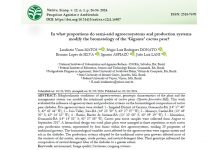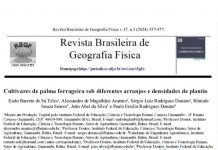Aims: To evaluate productivity and nutrient supply in ‘Gigante’ cactus pear with regulated deficit irrigation (RDI) using wastewater, compared to RDI using common water and fertilization with bovine manure. Study Design: Treatments: no fertilization and no irrigation (T1); no fertilization and RDI with wastewater (0.6 L plant-1 week-1) (T2); no fertilization and RDI with wastewater (1.2 L plant-1 week-1, applied once a week) (T3); no fertilization and RDI with wastewater (1.2 L plant-1 week-1, divided into two applications per week) (T4); with organic fertilization (60 Mg ha-1 of bovine manure) and RDI with common water (1.2 L plant-1 week-1) (T5); and with organic fertilization (60 Mg ha-1 of bovine manure) and no irrigation (T6). The treatments were arranged in a randomized complete block design, with five replicates. Place and Duration of Study: The experiment was carried out between October 2015 and August 2017 at Instituto Federal Baiano, Guanambi Campus, Brazil. Methodology: Productivity of green and dry matter, amount of macro and micronutrients applied in the soil by wastewater and by organic fertilizer, macro and micronutrient contents present in the cladodes tissues, and macro and micronutrient contents in the soil were evaluated. The wastewater used was collected in the stabilization pond of the campus. Results: Green matter yield was significantly higher in irrigated treatments. Regarding dry matter, its value was higher in T5 and it did not differ statistically in the others. Conclusions: RDI, using common water, provided a yield of green matter 2.47 times higher than in non-irrigated treatment with the same fertilization; in the absence of organic fertilization, RDI, using wastewater, provided a yield of green matter 1.96 times higher than in non-irrigated treatment; in the absence of irrigation, organic fertilization does not provided a yield higher than in non-fertilized treatment; and the contribution of N, K, Cu, Zn and Mn only by the wastewater is not enough to sustain the crop’s productivity in the long term.
Home
Publicações Productivity and nutrient supply in ‘Gigante’ cactus pear with regulated deficit irrigation...





